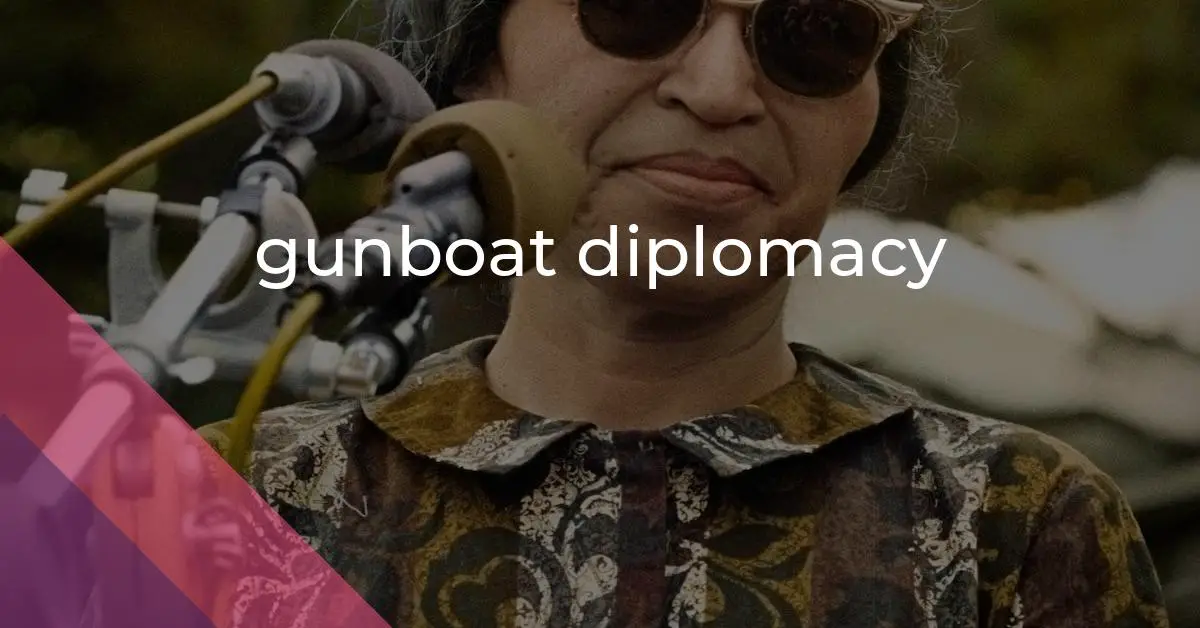gunboat diplomacy: Idiom Meaning and Origin
What does ‘gunboat diplomacy’ mean?
Gunboat diplomacy refers to the practice of asserting power and influence through the threat or use of military force, specifically through the presence of warships. It involves using military might as a tool for achieving diplomatic objectives.

Idiom Explorer
"Kiss the gunner's daughter" is a nautical idiom meaning to be punished by a flogging. The phrase originates from the practice of tying a crew member to a cannon and whipping them as a disciplinary action.
The idiom "I choose violence" is a figurative expression that conveys a willingness to engage in aggressive or confrontational behavior, often in response to a challenging or frustrating situation. It signifies a decision to forgo peaceful or diplomatic solutions and opt for a more forceful approach.
The idiom "horsetrading" refers to the practice of negotiating or bargaining in a shrewd or calculated manner, often involving give-and-take, compromise, and strategic maneuvering to achieve a desired outcome.
The idiom "hired muscle" refers to a person or group of individuals who are employed to use force or intimidation to achieve a specific goal or objective. They are typically hired by someone to protect their interests or to carry out illegal or violent activities on their behalf.
The idiom "hired gun" refers to a person who is hired to perform a specific task, often of a questionable or morally ambiguous nature, such as providing professional services, especially those involving violence or illegal activities, in exchange for payment.
The idiom "guns blazing" means to engage in a task or activity with great determination, energy, and enthusiasm.
The idiom "gunner's daughter" refers to a naval punishment where sailors were made to bend over a cannon to receive a flogging. It symbolizes being subjected to a severe punishment or reprimand.
The idiom "goon squad" refers to a group of aggressive and intimidating individuals who work together to enforce an agenda, often involving coercion or violence.
The idiom "go great guns" means to work or proceed with great energy, speed, or enthusiasm. It suggests a strong and successful effort, often used in reference to someone excelling or achieving a goal. The phrase originated from the booming sound of guns during battle or shooting competitions.
The idiom "give it the gun" means to apply maximum effort or speed to a task or activity.
Legacy Continues
Gunboat diplomacy is an idiom that refers to a form of foreign policy in which military force is used or threatened to achieve diplomatic objectives. It originated in the late 19th century during the era of colonialism and imperialism. In this idiom, the term "big gun" is often used to describe the use of powerful military forces or warships to intimidate or coerce other countries into compliance. Similarly, the phrase "guns blazing" can be associated with gunboat diplomacy, highlighting the aggressive and forceful nature of this approach to diplomacy.
During the late 19th and early 20th centuries, gunboat diplomacy was notably employed by the United States in the Western Hemisphere. This period was characterized by a series of interventions, where the U.S. would use its military might or the mere presence of warships to exert control over weaker nations. This approach was primarily aimed at protecting American economic interests and ensuring compliance from Latin American countries.
One significant example of gunboat diplomacy was the United States' intervention in Panama in 1903. The U.S. military presence and support for the Panamanian independence movement effectively pressured Colombia into granting Panama its independence. This allowed the U.S. to negotiate favorable terms for the construction and operation of the Panama Canal. The use of military force and the presence of warships in this case exemplify the concept of gunboat diplomacy and the power dynamics it entails.
Although gunboat diplomacy is often associated with the United States, other major powers throughout history have also employed similar tactics. European colonial powers like Britain and France frequently used gunboat diplomacy in their imperial pursuits. They would often force unequal treaties upon weaker nations or utilize military force to subjugate resistance. The idiom "gunboat diplomacy" thus encompasses a broader historical context of naval power and its role in projecting strength and influence.
Gunboat diplomacy is generally used in a critical or negative connotation, as it suggests an aggressive and unilateral approach to foreign relations. It implies a disregard for negotiation and compromise, relying instead on military might to achieve desired outcomes. This idiom highlights the coercive nature of some diplomatic practices and raises questions about the balance between power and diplomacy.
Although the era of overt gunboat diplomacy may have diminished, the idiom remains relevant in contemporary geopolitics. It serves as a reminder of the delicate balance between military power and diplomacy, and the enduring influence of gunboat diplomacy on global politics. In today's interconnected world, the use of military force or the presence of warships continues to shape international relations, albeit in more subtle and nuanced forms.
Gunboat diplomacy is an idiom that describes a form of foreign policy involving military force or the threat of force to achieve diplomatic objectives. It originated during the era of colonialism and imperialism, and was notably employed by the United States in the Western Hemisphere. The idiom "big gun" is often associated with gunboat diplomacy, representing the use of powerful military forces or warships. Similarly, the phrase "guns blazing" symbolizes the aggressive and forceful nature of this approach. While the era of overt gunboat diplomacy may have waned, the legacy of this idiom serves as a reminder of the delicate balance between power and diplomacy in shaping global politics.
Example usage
Examples of how the idiom *gunboat diplomacy* can be used in a sentence:
- The country's leaders threatened to use gunboat diplomacy to enforce their demands.
- The politician's aggressive rhetoric was seen as a form of gunboat diplomacy.
- In the past, gunboat diplomacy was often employed to gain control over foreign territories.
More "Diplomacy" idioms
We missed the mark - nothing found.



